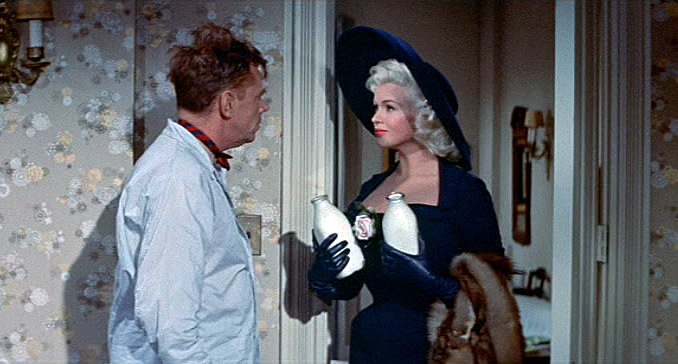Jayne Mansfield, who was not a dumb blond, spent most of her adult life in the service of that image. She was so successful that today, as she lies dead in New Orleans, there is very little to say about her that is not the invention of a press agent.
She was not an original. The role she chose for herself was created by others before she came to Hollywood to play it. Mae West was probably the original. Marilyn Monroe was probably the best and Jayne Mansfield was always a carbon copy.
Perhaps she learned the role from the movie screens of Bryn Mawr, Pennsylvania, or Dallas, Texas, where she grew up. She played it to the hilt. Everyone knew that Mansfield’s measurements were 40-22-35, but not many in her audiences knew very much more than that. She didn’t want them to.
She was a stereotype, almost a caricature, of the dumb blond: bigger, blonder, dumber, more publicity-conscious than any who had gone before.
The story goes that 20th Century-Fox hired her in the first place to use her as a bargaining point with Monroe, who was causing contract trouble. Her 10 or 12 years of fame were lived in Monroe’s shadow. The studio starred her at first in Monroe-type roles, like the sexy but warmhearted blonds in “The Wayward Bus” and “Will Success Spoil Rock Hunter?” – the role she played successfully on Broadway.
But she wasn’t really very good as an actress. She didn’t have the comic timing and the natural warmth of Monroe, and, truth to tell, she was never as sexy, either. Monroe’s appeal was based on a fresh quality, a hint of the girl next door, and Jayne never really understood that. She had the props, but she never found the secret.
By the early 1960s, Jayne Mansfield was at the peak of her fame and the low point of her acting career. Twentieth Century-Fox released her from her contract in 1960, and her roles became more and more built around her simple presence. She didn’t have to act. She only had to stand there.
Finally, in “Promises, Promises.” she did what no Hollywood actress ever does except in desperation: she made a nudie. By 1963, that kind of box office appeal was about all she had left.
Still, she continued to make Page 1. Her marriage with muscleman Mickey Hargitay in 1956 began to break up around 1962. They were reconciled in time to be lost overnight off the Florida Keys; the headlines suggested she had drowned. But the day after they found the capsized boat, they found Jayne and Mickey on a rock atoll with her press agent, who said the boat had overturned when Jayne thought she saw sharks. Mickey called it a lie when the papers called it a publicity stunt.
In 1964, Jayne married husband No. 3, former wrestler MATT Cimber. She sued for divorce last year. Lately she had been seeing her attorney, Samuel S. Brody, who died with her in the auto crash.
The recent headlines told of increasing personal tragedy. Her son, Zoltan, was mauled by a lion and after three operations developed spinal meningitis. Jayne herself contracted pneumonia. A few weeks ago, her 16-year-old daughter fled to Los Angeles police for protection, saying a male friend of her mother’s had beaten her. Brody’s wife filed for divorce, naming Jayne as co-respondent.
And so it went. Photos showed Jayne in a plunging neckline and miniskirt, visiting the House of Parliament in London. Pictures showed Jayne in a form-fitting sweater, embracing Zoltan under a Christmas tree after he was finally released from the hospital. Pictures showed her smiling, but always it was the same smile, learned so well over a decade.
What was behind it? There must have been occasional moments of thoughtfulness, and at times the public role must have seemed stupid and frustrating. She was said to have a genius I.Q. – over 160 – and that, at least, was not merely a press agent’s claim. But she kept her intelligence well hidden.
One night on the Johnny Carson show, Carson quizzed her for half an hour, trying to get through the facade. For every question, she had a breathlessly insipid answer. Carson kept probing.
“Nobody with an I.Q. of 160 can be that stupid,” he said. “What about your good grades in the university?” But Jayne kept smiling and pretended she didn’t understand what he was talking about. What else could she do?
Her only recent film role was a cameo part in the still unreleased “A Guide for the Married Man.” She played a dumb blond.












